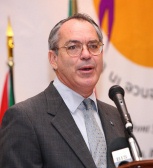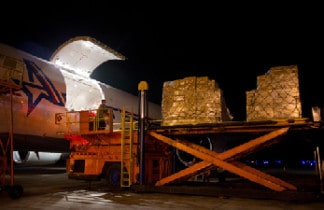Bahamas Deputy Prime Minister addresses UN 62nd General Assembly
NASSAU, Bahamas – Climate changes, trade and economic issues facing The Bahamas as a small island developing state were brought up by Bahamas Deputy Prime Minister and Minister of Foreign Affairs the Hon Brent Symonette at the 62nd Session of the United Nations (UN) General Assembly in New York last week.
Addressing world leaders on Tuesday, October 2, Mr Symonette said The Bahamas Government is dedicated to building a country where all citizens are provided with equal opportunities to develop to their full potential, regardless of race, ethnicity or background.
Mr. Symonette also commended the General Assembly for adopting the historic resolution 61/19 on the 200th Anniversary of the Abolition of the Atlantic Slave Trade and the commemoration of the International Day held on March 26, 2007.
The Deputy Prime Minister said that The Bahamas fully supports the project aimed at erecting a Permanent Memorial at the UN in commemoration of “this shameful” period in world history.

Hon. Brent Symonette
“The UN’s role in matters of sustainable development is crucial, particularly with regard to challenges demanding a truly global response, challenges such as climate change,” Mr. Symonette said. “For a small island developing state and archipelago like The Bahamas, climate change is a matter of crucial importance.”
He said that it is not just a matter or economics, but of survival, as 80 percent of The Bahamas’ land mass is within five feet of mean sea level.
“Climate change is also potentially devastating for our tourism sector, the main industry in The Bahamas, which generates 60 percent of The Bahamas’ GDP,” he added.
Mr. Symonette emphasised the need for an ambitious mitigation agenda for the post -Kyoto regime. Recent studies have shown that there are many mitigation options available, many of them win-win situations.
”We must, with unwavering commitment, explore options in an open and inclusive environment,” he said. “For countries like The Bahamas, even access to existing funds can prove difficult given the country’s deceptively high Gross National Income (GNI). It is vital therefore that the financial instruments and mechanisms available to developing countries be improved, so that they address the peculiar circumstances and special needs of different countries.”
He said the Caribbean must prepare for the possibility of continued increases in the incidences of natural hazards such as hurricanes, floods and earthquakes. He noted that one step taken by the region was the establishment of the Caribbean Catastrophe Risk Insurance Facility under the aegis of the World Bank.
Mr. Symonette also told the UN that the issue of strengthening the voice and participation of developing countries in international economic decision-making and norm-setting is especially important to The Bahamas.
“There is a definite need for concrete, realistic proposals to ensure the effective, permanent representation of developing countries, particularly small developing countries, in not only the Bretton Woods Institution and the WTO, but other international economic and financial institutions like the Financial Stability Forum (FSF), the Financial Action Task Force (FATF) and the Basle Committee,” he said.
Mr. Symonette said The Bahamas welcomes the positive development in the area of international cooperation in tax matters, namely the establishment of the Committee of Experts on International Cooperation in Tax Matters within the ECOSOC.
He noted that the establishment of this committee ensures that the interests of small developing states of the UN with different tax regimes, will be factored into discussions and recommendations aimed at adopting mutually agreed standards that do not unduly favour the wealth nations at the expense of meaningful development in non-OECD member countries and jurisdictions.
Mr. Symonette also addressed HIV/AIDS, terrorism and violence against children, women and other vulnerable groups which, despite efforts by the UN, challenge small developing states.
“The Bahamas values the role the United Nations, as the custodian of the interests of the world’s peoples, in particular the poor and vulnerable,” he said. “The Bahamas continues to believe that the UN Charter constitutes a viable and firm foundation on which the organization can be balanced and achieve its objectives to maintain international peace and security and, equally important, to promote development, and economic and social progress.”



